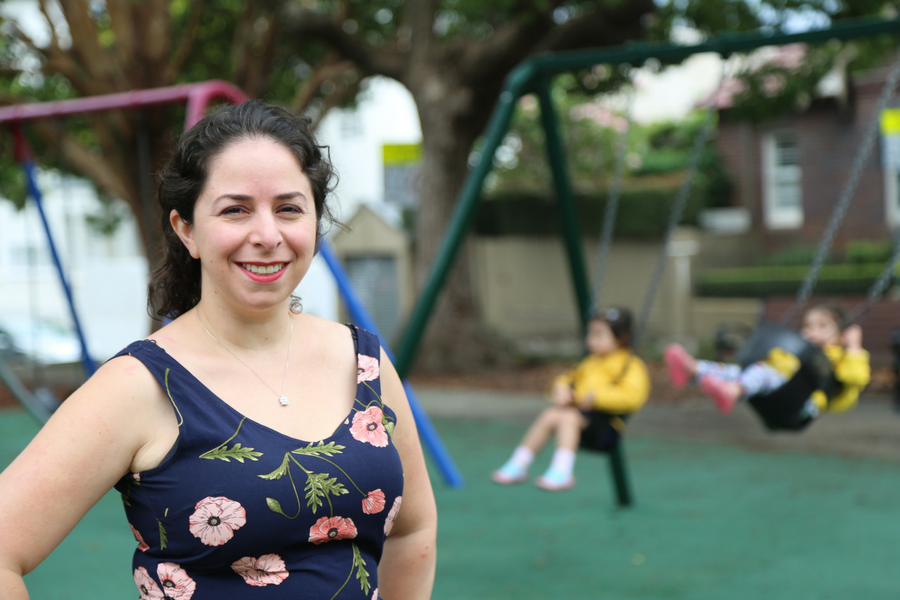The sharing economy has given us peer-to-peer networks for everything from empty space in the closet to cars to entire French chateaus.
Not quite as sexy but just as useful are peer-to-peer networks facilitating the easy rental of (often expensive) baby gear, with Sydney startup Kindershare established last year to do just that.
The business was founded by Vanouhi Nazarian, a chartered accountant with more than 15 years of experience working with the likes of PwC and not-for-profits, and Ara Margossian, a commercial lawyer.
The idea for a service like Kindershare first came to Nazarian after a trip the family took when her first daughter was five months old.
“It was a pain having to buy a lot of specialist equipment, take it all with us, then trying to find somewhere in our tiny workers cottage to store it all. While I’d offer my equipment to friends and family when they asked for it, there was no easy way of letting them know what we had available,” she said.
“Hearing about the sharing economy, I went looking for a place to list my items, but couldn’t really find a suitable site.”
The push to actually do it herself came around a year ago, when Nazarian had to come up with a business idea for a university assignment; it was then that she realised that if instead of just renting out her own equipment she helped others rent out theirs she could have a business.
Despite her past work experience running and growing larger companies, Nazarian said she quickly realised building a new company requires a completely different skill set.
Reading about the journeys of other startup founders helped, Nazarian said, but the key learnings came from the Launchpad program at the University of Technology Sydney, a program based on the D.School program at Stanford.
As it goes with many a sharing economy platform, Kindershare works by having a renter search Kindershare for the equipment they need. Once they find an item close to them they can book and pay for it online, and then get in touch with the owner to arrange the pick up or delivery of the item. The renter pays the fee, Nazarian explained, with Kindershare also putting a hold on their payment card for the security deposit the owner has charged.
Owners, meanwhile, must first check that their items meet Australian standards and are not subject to recall, Nazarian said.
After taking and uploading pictures and writing a description of the item, they can begin accepting listings.
“Owners have the flexibility of deciding how much they want to rent their items for, and what security deposit they wish to charge. By listing on our website, owners receive coverage under our insurance policy, and if there is any damage to their items, Kindershare will pay up to 75 percent of the replacement cost,” Nazarian said.
Listing an item on Kindershare is free, however the platform charges a commission of 13 percent on any rentals; according to Nazarian this covers the costs of insurance, marketing, and the aforementioned guarantee that Kindershare will pay up to 75 percent for a damaged or lost item.
Kindershare also has a public and product liability insurance policy covering users for up to $20 million dollars for their liability to third parties for personal injury or property damage.
Targeting parents with children aged up to five years old, Kindershare is reaching its target market through digital marketing, as well as “market-style events”. Nazarian said the startup saw 150 families rent items through the platform over the Christmas period.
There is another Australian startup playing in this space: Melbourne’s Eva Wintersberger and Tom Brown founded Tree Hut Village in 2016 after going on holidays to the Whitsundays with their then-four month old son, Max. The platform works in much the same way as Kindershare, again looking to help those travelling with young children save on equipment costs.
However, for Nazarian the “obvious” options for those needing baby equipment are more buying new items, receiving hand me downs, renting from a business-to-consumer (B2C) rental company, or searching sites like Gumtree.
With this in mind, she said that 2018 will see Nazarian and Margossian look to spread the Kindershare message across Australia, while also taking “initial steps” to move internationally.
Image: Vanouhi Nazarian. Source: Supplied.




















Trending
Daily startup news and insights, delivered to your inbox.